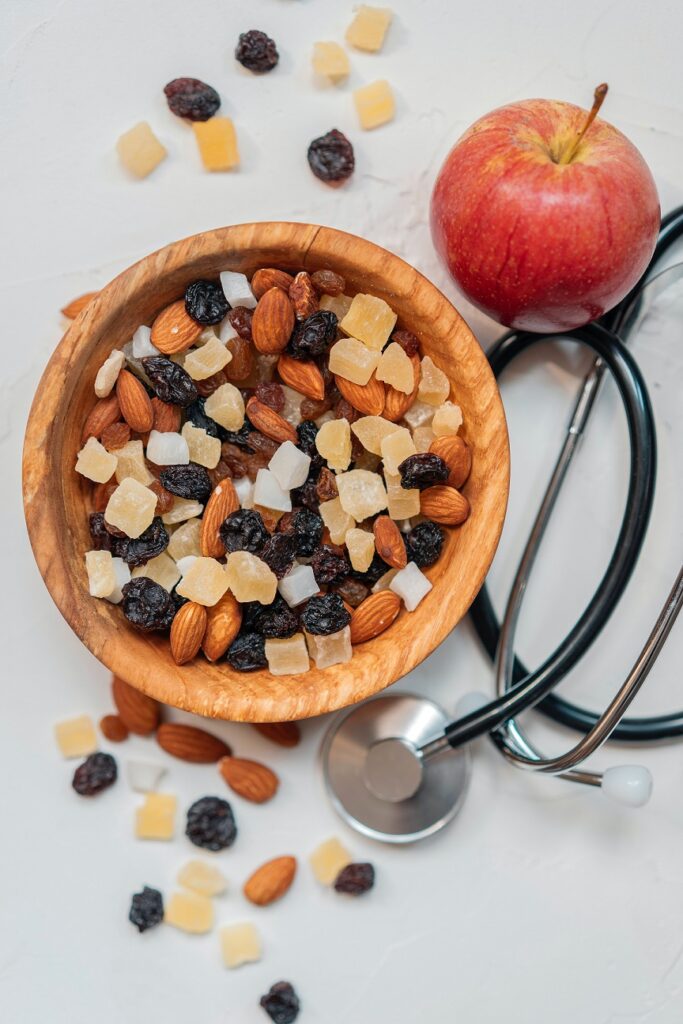High blood pressure, or hypertension, is a prevalent health condition that affects millions of people worldwide. It is a significant risk factor for cardiovascular disease and other serious health complications. While there are various factors that contribute to hypertension, diet plays a crucial role in its development and management. In this article, we will explore the impact of diet on blood pressure and discuss dietary strategies to help maintain healthy blood pressure levels.
Sodium Intake: High sodium consumption is strongly associated with elevated blood pressure. Sodium, a component of salt, causes the body to retain water, leading to increased blood volume and higher blood pressure. Reducing sodium intake is a key dietary approach to managing blood pressure. The American Heart Association recommends limiting sodium intake to no more than 2,300 milligrams (mg) per day, or even lower to 1,500 mg for certain individuals, such as those with hypertension, diabetes, or kidney disease. To reduce sodium intake, avoid processed foods, fast food, and canned goods, as they often contain high levels of sodium. Instead, opt for fresh, whole foods and use herbs, spices, or salt substitutes to enhance flavor.
Potassium-Rich Foods: Potassium is a mineral that helps regulate blood pressure. Increasing potassium intake can counteract the negative effects of sodium. Potassium-rich foods include bananas, oranges, spinach, sweet potatoes, tomatoes, and avocados. Incorporating these foods into your diet can help maintain healthy blood pressure levels. However, it is essential to consult with a healthcare professional, as certain medical conditions may require potassium restriction.
Magnesium-Rich Foods: Magnesium is another mineral that plays a role in blood pressure regulation. Studies have shown that individuals with low magnesium levels may have higher blood pressure. Including magnesium-rich foods in your diet, such as leafy green vegetables, nuts, seeds, and whole grains, can be beneficial. In some cases, magnesium supplements may be recommended under medical supervision.
Calcium-Rich Foods: Calcium is not only essential for maintaining strong bones but also plays a role in blood pressure management. Adequate calcium intake has been associated with lower blood pressure levels. Dairy products, such as milk, yogurt, and cheese, are excellent sources of calcium. However, if you have lactose intolerance or prefer non-dairy options, you can choose calcium-fortified plant-based milk or incorporate calcium-rich foods like tofu, sardines, or leafy greens into your diet.
The DASH Diet: The Dietary Approaches to Stop Hypertension (DASH) diet is a well-known dietary pattern that emphasizes the consumption of fruits, vegetables, whole grains, lean proteins, and low-fat dairy products. This eating plan is rich in nutrients, such as potassium, magnesium, and calcium, while being low in sodium and saturated fats. Numerous studies have shown that following the DASH diet can effectively lower blood pressure. It is important to note that the DASH diet is not a short-term solution but rather a long-term approach to healthy eating.
Omega-3 Fatty Acids: Omega-3 fatty acids, found in fatty fish like salmon, mackerel, and sardines, have been shown to have a positive effect on blood pressure. These healthy fats help reduce inflammation and improve heart health. If you don’t consume fish, you can consider plant-based sources of omega-3s, such as flaxseeds, chia seeds, and walnuts. Additionally, omega-3 supplements may be an option for those who cannot meet their needs through dietary sources alone.
Limit Alcohol Consumption: Excessive alcohol intake can contribute to high blood pressure. While moderate alcohol consumption may have some cardiovascular benefits, excessive or regular heavy drinking can raise blood pressure. It is recommended to limit alcohol consumption to moderate levels, which means up to one drink per day for women and up to two drinks per day for men. However, it’s important to note that not everyone should consume alcohol, especially those with certain health conditions or taking specific medications. If you have concerns or questions about alcohol and its impact on your blood pressure, it is best to consult with your healthcare provider.
Reduce Added Sugar Intake: A diet high in added sugars has been linked to increased blood pressure. Consuming excessive amounts of sugary beverages, sweets, and processed foods can lead to weight gain, insulin resistance, and higher blood pressure. Limiting the intake of sugary foods and opting for natural sources of sweetness, such as fresh fruits, can help manage blood pressure and promote overall health.
Caffeine Sensitivity: Caffeine is a stimulant found in various beverages like coffee, tea, and energy drinks. While the impact of caffeine on blood pressure can vary among individuals, some people may be more sensitive to its effects. If you notice that caffeine consumption leads to elevated blood pressure or if you have been advised by your healthcare provider to limit caffeine intake, it is recommended to moderate your consumption or switch to decaffeinated alternatives.
Weight Management: Maintaining a healthy weight is essential for blood pressure management. Excess weight puts strain on the heart and increases the risk of hypertension. Adopting a balanced diet that is rich in whole foods, low in processed foods, and portion-controlled can support weight loss or weight maintenance efforts. Combining a healthy diet with regular physical activity is key to achieving and sustaining a healthy weight.
Mindful Eating: In addition to food choices, the way we eat can also impact blood pressure. Mindful eating involves paying attention to the sensations, flavors, and satisfaction derived from food. It helps promote healthier eating habits, such as eating slowly, recognizing hunger and fullness cues, and enjoying the eating experience. Practicing mindful eating can contribute to better portion control, reduced stress-related eating, and overall improved dietary habits.
Dietary Sodium Reduction Strategies: Apart from avoiding high-sodium processed foods, there are additional strategies to reduce sodium intake. Rinsing canned foods like beans or vegetables under running water can help remove excess sodium. Cooking meals from scratch allows for better control over sodium content. Using herbs, spices, citrus juices, or vinegar as flavor enhancers instead of salt can help reduce sodium intake without compromising taste.
It is important to remember that dietary modifications for blood pressure management should be tailored to individual needs. Factors such as age, overall health status, medications, and personal preferences should be considered. Consulting with a healthcare professional or a registered dietitian can provide personalized guidance and support in developing an appropriate dietary plan.
Diet plays a significant role in blood pressure management. Adopting a balanced eating pattern that focuses on whole foods, limits sodium and added sugars, and incorporates nutrients like potassium, magnesium, and calcium can help maintain healthy blood pressure levels. Combining a healthy diet with regular physical activity, weight management, and other lifestyle modifications can contribute to overall cardiovascular health and reduce the risk of hypertension-related complications. Making conscious dietary choices and implementing long-term healthy eating habits are key to achieving and sustaining blood pressure control.

